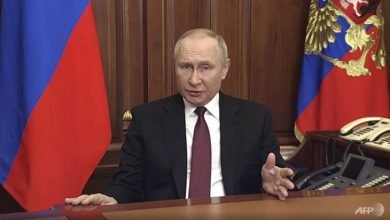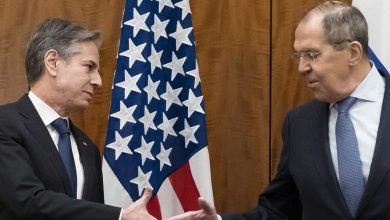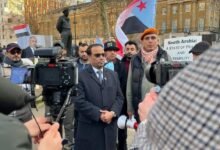international
Assad raises prospect of clashes with U.S. forces in Syria
[su_label type=”info”]SMA News – Agencies[/su_label][su_spacer size=”10″] President Bashar al-Assad raised the possibility of conflict with U.S. forces in Syria if they do not withdraw from the country soon In an interview with Russia’s RT international broadcaster, Assad said he would negotiate with fighters backed on the ground by Washington, but would reclaim territory they control by force if necessary, whether or not American troops supported them.
In Washington, the State Department said it was not looking to fight Syrian or Iranian forces, but would use “necessary and proportionate force” to defend U.S. and partner forces in the fight against Islamic State in Syria. “The U.S.-led global coalition remains committed to focusing on the defeat-ISIS mission in Syria and does not seek to fight the government of Syria or Iran, or Iranian-supported groups, in Syria,” a State Department official told Reuters.
“However, as we have said in the past, if attacked we will not hesitate to use necessary and proportionate force to defend U.S., coalition, or partner forces engaged in operations to defeat ISIS,” the official added. In the RT interview Assad also responded sharply to U.S. President Donald Trump’s description of him as an animal, saying “what you say is what you are”. Assad, who is backed by Russia and Iran, appears militarily unassailable in the war that has killed an estimated half a million people, uprooted around 6 million people in the country, and driven another 5 million abroad as refugees.
Around 2,000 U.S. special forces troops are believed to be on the ground in Syria, where they have aided a group called the Syrian Democratic Forces (SDF), which is led by the YPG, a Kurdish militia. The U.S.-backed group holds the largest area of Syrian territory outside government control, but has tried to avoid direct clashes with the government during the multi-sided war.
Assad said the government had “started now opening doors for negotiations” with the SDF. “This is the first option. If not, we’re going to resort to … liberating those areas by force. We don’t have any other options, with the Americans or without the Americans,” he said in the text of an interview published by Syria’s state news agency. “The Americans should leave, somehow they’re going to leave,” he said, adding that Washington should learn the lesson of its war in Iraq, which lasted longer and was much costlier than anticipated.
“They came to Iraq with no legal basis, and look what happened to them. They have to learn the lesson. Iraq is no exception, and Syria is no exception. People will not accept foreigners in this region anymore,” he said. Trump said in April he wanted to withdraw American troops from Syria relatively soon, but also voiced a desire to leave a “strong and lasting footprint”.
U.S. Defense Secretary Jim Mattis said on April 30 the United States and its allies would not want to pull troops out of Syria before diplomats win the peace. Kino Gabriel, a spokesman for the SDF, said in response to Assad’s comments that a military solution would “lead to more losses and destruction and difficulties for the Syrian people”. The SDF wants a “democratic system based on diversity, equality, freedom and justice” for all the country’s ethnic and religious groups, he added in a voice message to Reuters.
In Washington, the State Department said it was not looking to fight Syrian or Iranian forces, but would use “necessary and proportionate force” to defend U.S. and partner forces in the fight against Islamic State in Syria. “The U.S.-led global coalition remains committed to focusing on the defeat-ISIS mission in Syria and does not seek to fight the government of Syria or Iran, or Iranian-supported groups, in Syria,” a State Department official told Reuters.
“However, as we have said in the past, if attacked we will not hesitate to use necessary and proportionate force to defend U.S., coalition, or partner forces engaged in operations to defeat ISIS,” the official added. In the RT interview Assad also responded sharply to U.S. President Donald Trump’s description of him as an animal, saying “what you say is what you are”. Assad, who is backed by Russia and Iran, appears militarily unassailable in the war that has killed an estimated half a million people, uprooted around 6 million people in the country, and driven another 5 million abroad as refugees.
Around 2,000 U.S. special forces troops are believed to be on the ground in Syria, where they have aided a group called the Syrian Democratic Forces (SDF), which is led by the YPG, a Kurdish militia. The U.S.-backed group holds the largest area of Syrian territory outside government control, but has tried to avoid direct clashes with the government during the multi-sided war.
Assad said the government had “started now opening doors for negotiations” with the SDF. “This is the first option. If not, we’re going to resort to … liberating those areas by force. We don’t have any other options, with the Americans or without the Americans,” he said in the text of an interview published by Syria’s state news agency. “The Americans should leave, somehow they’re going to leave,” he said, adding that Washington should learn the lesson of its war in Iraq, which lasted longer and was much costlier than anticipated.
“They came to Iraq with no legal basis, and look what happened to them. They have to learn the lesson. Iraq is no exception, and Syria is no exception. People will not accept foreigners in this region anymore,” he said. Trump said in April he wanted to withdraw American troops from Syria relatively soon, but also voiced a desire to leave a “strong and lasting footprint”.
U.S. Defense Secretary Jim Mattis said on April 30 the United States and its allies would not want to pull troops out of Syria before diplomats win the peace. Kino Gabriel, a spokesman for the SDF, said in response to Assad’s comments that a military solution would “lead to more losses and destruction and difficulties for the Syrian people”. The SDF wants a “democratic system based on diversity, equality, freedom and justice” for all the country’s ethnic and religious groups, he added in a voice message to Reuters.








